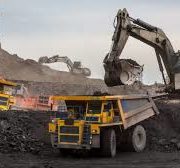
As cabin filtration becomes more of a necessity that a luxury it is important to understand how filtration works and what is necessary for you. One of the most common queries asked is how does filtration work and  what level of filtration is needed for your job site.
what level of filtration is needed for your job site.
Sy-Klone, the world leaders in cabin and engine filtration used throughout Australian mining and construction provide some clarity.
How Air Filters Work
Filter media is made up of many criss-crossed fibres layered in random directions. When particles from the working environment enter the air intake port, the particles are impacted and intercepted onto the filter fibres. These particles are subjected to specific filtration mechanics and are dependent on the size of the particle and airflow velocity.
Here is a list of the filtration mechanics and their respective definitions:
1. Inertial impaction – Occurs when a particle encounters a filter fibre due to the inertia of the particle.
Example: A large dust particle is unable to change direction of flow due to its inertia, so it impacts the fibre and becomes attached to it.

2. Interception – Occurs when a particle follows a gas streamline that happens to come in contact with the surface of a fibre.
Example: An intermediate dust particle that readily follows the airflow stream comes in contact with a filter fibre.
3. Diffusion – Occurs when particles do not follow gas streamlines as readily and are governed by random particle motion (Brownian motion of small particles) Example: A small particle, such as certain exhaust particles, encounter filter fibres at random.
4. Electrostatic attraction – Occurs when an electrostatic charge on the filter fibres are present. Example: Static charge on a fabric creating static cling.
*In terms of filtration, the most important filtration mechanics pertaining to everyday use are: 1) Inertial impaction and 2) Interception.
The larger particles that encounter the engine filter tend to impact onto the exterior surface of the filter media. The smaller particles that follow airflow streamlines tend to impact and intercept within the depth of the engine filter media. For smaller particles, the filter fibres act as branches that catch harmful engine contaminants passing through the filter. Thus, when a Cab Air Quality System utilises a pre-cleaner, such as the RESPA-CF2, HVAC life is extended and down time is reduced as fewer contaminants are reaching the filter.
A complete Cab Air Quality system is comprised of three parts:
- Fresh Air Pre-cleaner/Filter/Pressuriser
- High-Efficiency Recirculation Filtration
- Pressure Monitor
How Complete Cab Air Quality System Works:
- Fresh air and debris are pulled into the powered pre-cleaner/filter/pressuriser (RESPA-CF2 shown).
- Debris is separated from the airflow and ejected.
- Cleaned and filtered air is delivered to the machine’s HVAC unit without added restriction by the powered RESPA unit. This creates a positive pressure, which prevents dust sucking into the cab.
- Clean, filtered and conditioned air flows through cab.
- Monitor alerts operator to loss of positive pressure in cab and when to change RESPA filter.
- High-efficiency recirculation filtration (powered RESPA-CFX or non-powered RESPA-FFX2) continuously removes dust from cab, minimizing settled dust accumulation. Clean, filtered air flows back to HVAC plenum.
Note: Sy-Klone’s MERV 16 filter media has special patented properties that shed most particles.
MERV Filters
What is the definition of MERV and what does MERV mean when buying an air filter? MERV is an acronym for “Minimum Efficiency Reporting Value”. The MERV rating on an air filter describes its efficiency as a means of reducing the level of 0.3 to 10 micron-sized particles in air which passes through the filter. Higher “MERV” means higher filter efficiency. The purpose of the MERV standard is to permit an “apples to apples” comparison of the filtering efficiency of various air filters.
Air filter efficiency refers to the relative ability of a filter to remove particles of a given size or size range from air passing through the filter. If a filter were 100% efficient, none of the particles in a given size range would escape the filter and air which has passed through such a filter would contain zero particles.
The MERV Efficiency Rating Scale ranges from 1 to 16, with 1 being the lowest efficiency and 16 describing the highest efficiency. The particle size range addressed by the MERV scale is 0.3 to 10 microns. A logical inference is that if an air filter is removing particles down to 0.3-10 microns, it is certainly also at least that efficient at removing larger sized particles. Sy-Klone’s patented high-efficiency MERV 16 filters have unique properties, as the filter media sheds most dirt rather than the particles being embedded in the filter.
HEPA Filters
HEPA air filters are not MERV rated as they exceed the ASHRAE test protocol 52.2 used in determining the MERV ratings. In fact, HEPA air filters are the ONLY mechanical air filters that are tested and certified to meet a specific efficiency at a specific particle size. All HEPA air filters must meet a minimum efficiency of 99.97% at 0.3 microns. ASHRAE or MERV air filters are tested using the Dust Spot tests that incorporate some fine dust, powdered carbon and some cotton linters. The Dust Spot test particle size range is from 0.3 microns to 50 microns in size with an average size of approximately 20 microns in size.
HEPA air filters are tested using DOP, Mineral Oil and other materials that generate a mono-dispersed particle that are all .3 microns or smaller in size. In essence, if 10,000, 0.3-micron sized particles are blown into a HEPA air filter, only 3 particles are allowed to pass through. Thus, you get the 99.97% at 0.3-micron rating. If you were to use the HEPA test on a 95% ASHRAE air filter they would be about 50% efficient on 0.3-micron sized particles once they loaded up with dust. So, HEPA air filters are at least 50% more effective at removing respirable sized airborne particles than any of the ASHRAE air filters previously available on the market.

Selecting the best RESPA® Filter for your environment:
Where can you use the RESPA Air Quality Systems?
- Operator Cabs
- Control Rooms
- Trailers
- Electrical Cabinets
- Caravans
- And more!
MERV 16 Filter:
Recommended for uses where airborne contaminants place operator at risk, including contaminants such as Beryllium, DPM (Diesel Particulate Matter), and RCS (Respirable Crystalline Silica). We highly recommend this filter as it represents the best mix of high efficiency filtration and economy.

For more information contact Lyons the experts in air-conditioning and filtration on (08) 9259 7777 or email enquiries@lyons.com.au. Lyons can help you make the right decision first time, every time!
HEPA Filter:
Recommended when the very highest level of filtration is needed, OR where HEPA filters are necessary due to regulatory requirements. Refer to ISO23875 Cabin Filtration standard for more details
* The original article can be found on Sy-Klone website. Lyons are a direct solutions provider distributor of Sy-Klone International


 Having a working air conditioning system in your vehicle is fairly essential in Australia. There is few things as frustrating than getting in your car on a hot summer’s day only to be greeted by warm stuffy air, despite the air conditioning being on full.
Having a working air conditioning system in your vehicle is fairly essential in Australia. There is few things as frustrating than getting in your car on a hot summer’s day only to be greeted by warm stuffy air, despite the air conditioning being on full.





 what level of filtration is needed for your job site.
what level of filtration is needed for your job site.



